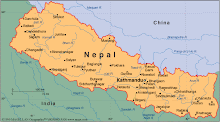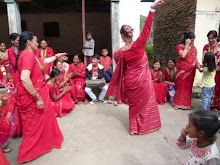


These days I'm processing my field work experiences and thoughts from last month. Now that I've had time to rest, recover, think, and do loads of laundry.
I'll be writing up an official report of my experiences to submit to VSO Nepal that will be part of a document for policy advocacy at the government level and programming recommendations. My part will focus on gender in Nepal, in particular. And I have saved my more personal thoughts and experiences in a journal that I kept every day during the research.
Our focus: poverty. What does poverty really look like right now in the rural areas of Makwanpur? And specifically, for excluded women in this area?
Women could be considered excluded for a variety of reasons. In this project, by geography. Some villages are extremely remote. These communities don't have access to health services, education, or representation in local government. Invariably, however, geography seems connected with caste and ethnicity here. Usually it is the so-called higher caste communities that live closer to the main roads, and services. Indigenous groups, so-called lower caste communities live further away.
Our research was extremely thorough and participatory. We met with communities and had them give us information about who lives where, what services they have access to, the main community resources, and challenges.
We also had them define what poverty means. This is important to note - as poverty is extremely relative. In one community, there were people who didn't have toilets, but they considered themselves "middle class", because they live in a beautiful environment, have access to food all year long, and their children can easily attend school.
In another community, someone could live in a well built house and have all the amenities and food they need, but if they are comparing themselves to what they think it is to be well off from the television or stories they've heard, they consider themselves very poor.
One of the things that absolutely amazed me - coming from a culture where I only knew 3 of my neighbors really well- is that we could go to communities, sit with an individual or group, and get extremely detailed information for 50 to 100 of their neighbors. Number of people in the household, livelihood, access to electricity, water and toilets, levels of children in the house...
I got to know Hatiya, the area we our team was in, extremely well. Our team walked up into the jungle (i.e. forest) and met with small groups from the indigenous communities. We walked through rivers, and field and field and field of rice.
It is the rainy season, after all. Season of corn that has been harvested and is hanging from roofs. Season of rice shooting up as women bend over and plant, plant.
Several times women would grin at me, happy to see a visitor, and welcome me to come and work and plant with them. At those times, I wished our tasks weren't so overwhelming and I could have just worked along side them for a few hours. I've been told that planting rice is extremely difficult.
Also the season of, yes, storms. Usually we could just duck onto someone's porch for the hour or so that it rained so hard that it was hard to see the other side of the field. Once in our 15 days the rain didn't stop after an hour, and we realized that now we had to make a run for it.
When it rains that hard during the monsoon season, the rivers take over the roads and the buses stop running. So we ran through water up to my knees along a path way that had been dry 2 hours before. Made it to the bus, which - after strategizing for about 30 minutes - made a go for it and made it across the river. I'm not quite sure how, but I was certainly grateful to make it home for warm tea and a shower.
I drew up pictures of the maps that communities would make with local materials: rocks, leaves, sticks, dirt, was the team photographer, and hired a local youth to join our team and help with the health surveys.
I have a whole different sense and understanding of the work that we do in our organization now, and will find out this weekend how the management - using this information - to come up with the project goals for our upcoming 4 year project.



1 comment:
t's such a great site. fanciful, acutely intriguing!!!
-------
[url=http://oponymozgowe.pl]Opony[/url]
[url=http://pozycjonowanie.lagata.pl]Pozycjonowanie[/url]
[url=http://www.cool.com.pl/opony/site3337/]opony[/url]
Post a Comment